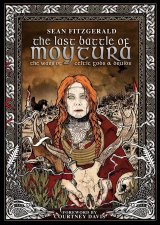The Last Battle of Moytura
Sean Fitzgerald is an Irish artist living in a remote area of the North West of the country, surrounded by nature and ancient places. Not far from his home, there are many legendary places such as Tory Island, the misty island inhabited by Balor, lord of the Fomorians, thought to be the original race to have inhabited Ireland. A few miles away there is Dun Luiche, the spot where the Sun god, Lugh Lamfhada, built his fort, and Gleann Neimhe, the 'poisonous glen', where according to the same legends Lugh placed Balor's wounded head after his killing. These places and his passion for folklore and Irish mythology inspired the artist to jump in a long research to track down the vestiges of those events in the modern place names.
The book tells of the Fomorian tribe, a feral warrior tribe of Balor of the Evil Eye. This was a time when Gods walked among us. And these were the Gods of chaos and wild nature. Punctured animal patterns and symbols protect these warriors. They wear no clothing in battle, lest they should hide the figures on their bodies which give them protection from death. With each story, it introduces us to the importance of Lugh Lamhfada, the Morrígan, the Dagda and many more. With every single page highly illustrated with Celtic knotwork threaded through images of deities and nature. With the information drawing on archaeological and historical research, as well as literary and oral sources on Celtic deities and rituals.
Translation
Translate and read this book in other languages:
Select another language:
- - Select -
- 简体中文 (Chinese - Simplified)
- 繁體中文 (Chinese - Traditional)
- Español (Spanish)
- Esperanto (Esperanto)
- 日本語 (Japanese)
- Português (Portuguese)
- Deutsch (German)
- العربية (Arabic)
- Français (French)
- Русский (Russian)
- ಕನ್ನಡ (Kannada)
- 한국어 (Korean)
- עברית (Hebrew)
- Gaeilge (Irish)
- Українська (Ukrainian)
- اردو (Urdu)
- Magyar (Hungarian)
- मानक हिन्दी (Hindi)
- Indonesia (Indonesian)
- Italiano (Italian)
- தமிழ் (Tamil)
- Türkçe (Turkish)
- తెలుగు (Telugu)
- ภาษาไทย (Thai)
- Tiếng Việt (Vietnamese)
- Čeština (Czech)
- Polski (Polish)
- Bahasa Indonesia (Indonesian)
- Românește (Romanian)
- Nederlands (Dutch)
- Ελληνικά (Greek)
- Latinum (Latin)
- Svenska (Swedish)
- Dansk (Danish)
- Suomi (Finnish)
- فارسی (Persian)
- ייִדיש (Yiddish)
- հայերեն (Armenian)
- Norsk (Norwegian)
- English (English)
Citation
Use the citation below to add this book to your bibliography:
Style:MLAChicagoAPA
"The Last Battle of Moytura Books." Literature.com. STANDS4 LLC, 2025. Web. 22 Feb. 2025. <https://www.literature.com/book/the_last_battle_of_moytura_166>.








Discuss this The Last Battle of Moytura book with the community:
Report Comment
We're doing our best to make sure our content is useful, accurate and safe.
If by any chance you spot an inappropriate comment while navigating through our website please use this form to let us know, and we'll take care of it shortly.
Attachment
You need to be logged in to favorite.
Log In